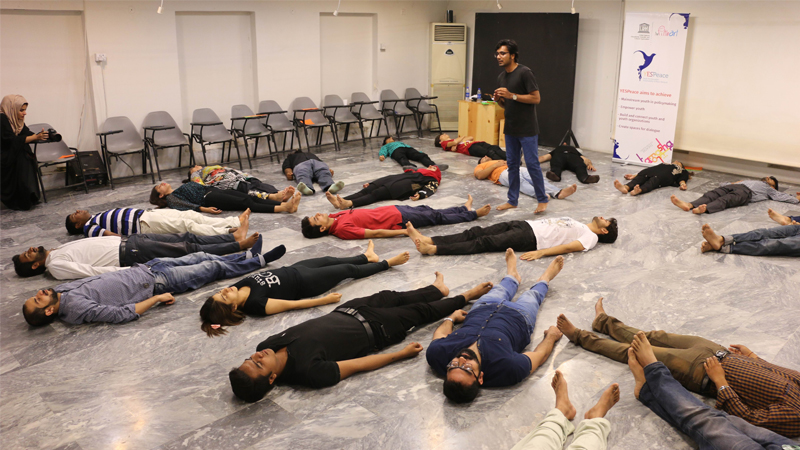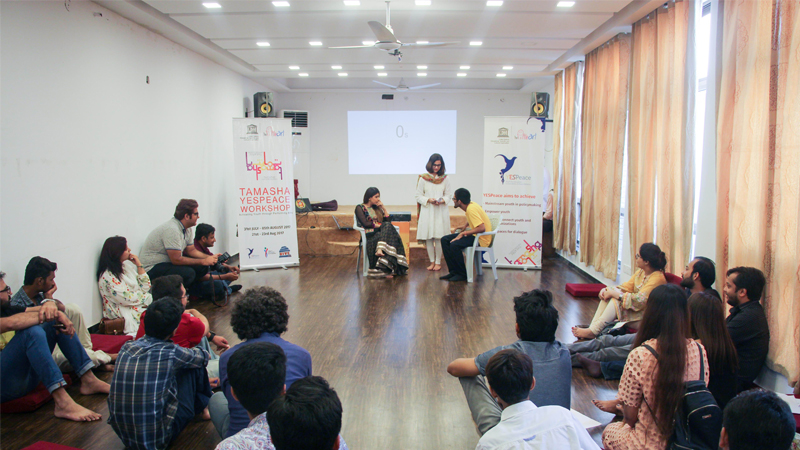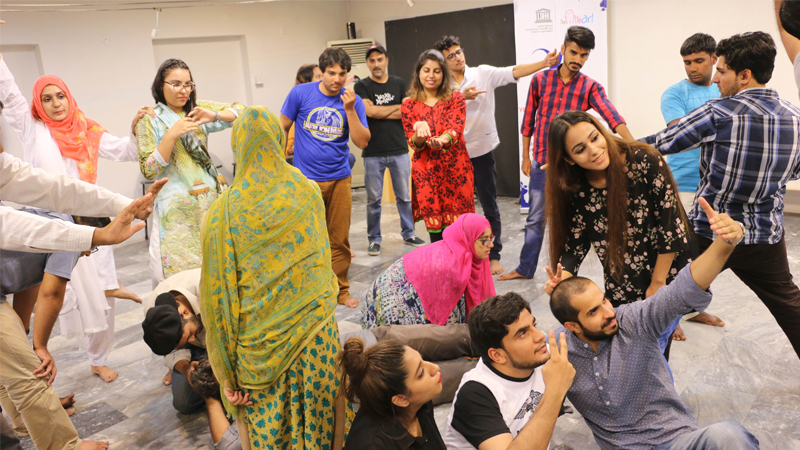
In the protected space of Alliance Française cultural centre in Lahore, a group of three dozen young people hop, dance and run. The air is made candid by chairs pushed to the margins and floor becoming the site of all action.
Participants are required to leave out their shoes, and feel the grey marble beneath their feet—an important first step in shedding presumptions and moving out of one’s self-image. The low-hanging ceiling is studded with bulb cases that fill the room with white milky light. The arena is adorned with life-size standees, one of which has a camera perched atop. As seen from the camera, a giant projector screen stands along the wall and serves as a clean backdrop for the stage.
“Move,” cries the high-pitched voice, and the place starts to buzz with participants walking inside the marked arena. They ramble in circles, criss-cross and zigzag, but just before they start to get comfortable, the next instruction bangs in, “Run!” The place transforms into a beehive exterior where bees of all shapes and sizes scramble for space while also avoiding the slightest of collision. Finally, they get to hear “stop!” and follow up with loud breathings and big smiles.
So begins another session of the six-day long Tamasha YES Peace Workshop at the Alliance Française centre. Organised by The Little Art and sponsored by United Nations Educational, Scientific & Cultural Organisation (UNESCO), the workshop spreads over three rounds, the second of which was a two-day stint at Faiz Ghar, Model Town, Lahore. Selected participants will proceed to the third round and perform at a grand event in Islamabad in December.
Each activity starts and ends with participants holding hands and making a circle. This ritual of circle making instils both professional discipline and intimacy in the group.
The group activities are designed to improve focus, active listening, management of time and space, cue taking and teamwork. A separate group of more clinical acts include breathing, tonal and mindfulness exercises. Lastly, a couple of story building exercises seek to go beyond the limitations of realism and open the floodgates of imagination while also providing a taste of improvisational theatre. Other than these activities, there are coaching sessions on acting, street theatre, theatre production and global citizenship.
Organised by The Little Art and sponsored by the United Nations Educational, Scientific & Cultural Organisation, the workshop took place in three rounds, the second of which was a two-day stint at Faiz Ghar, Lahore. Selected participants will proceed to the third round and perform at an event in Islamabad in December
UNESCO’s “Youth for Education, Sustainability & Peace”, or YES Peace, is a cross-border network of networks that supports youth mobilization and capacity building. Its stated goal is to “create a critical mass of young people who envisage a more peaceful and sustainable society and become active crusaders for achieving the Sustainable Development Goals.” The Pakistan chapter of YES Peace was formed in December 2016 with support from UNESCO Islamabad, and with The Little Art as its founding member.

More specifically, YES Peace is focused on the Target 4.7 of the 2030 SDGs, which is about educating youth on human rights, gender equality, peace and non-violence, global citizenship, appreciation of cultural diversity, sustainable development and sustainable lifestyles.
This workshop’s organiser and primary trainer Umair Mushtaq, is a theatre practitioner and founder of “Tamasha –Activating Youth through Performing Arts”, a theatre project of The Little Art. He got his informal education of performing arts while working with various groups nationally and internationally. He has conducted drama therapy workshops to empower domestically abused women and children from humble backgrounds. With Tamasha, he brings this work to the youth category, aged 16-25.

What learning outcomes do you hope to see in the participants of this workshop?
I believe youth has the potential to help reshape a community and go beyond the limits to make this world a better place. Performing arts is the mother of all art forms, and I am using it to engage and mobilise the youth so it may acquire the ability to start something small in their own communities and gradually affect the whole damaged society. Participants will become the next generation of change-makers and activists, working to uplift the society and hopefully making this world a peaceful place for coming generations.
The mission of this workshop is to make individuals conscious of solution-focused, respectful, non-exploitative and ethical relationships. This is achieved through drama techniques based on the integrative decision-making model of ethical behaviour.
How can theatre teach peace and conflict resolution?
We made a connection between theatre and conflict resolution by using acting methods that embody positive psychology, art of negotiation and executive communication skills. We also focused on interpersonal communication through various theatre games. All of these techniques help people know themselves better and identify what peace means to them.

On another level, theatre is known to be a meditative experience that helps us better understand our surroundings in a peaceful environment.
Can some of these activities become part of mainstream education?
The concept of “art in education” has been acknowledged as one of the most interactive ways of conducting formal or informal education. This integration of arts in education would definitely help in achieving the real aim of education, which is to teach students how to think, rather than what to think.
How would you describe the theatre scene in Pakistan?
Pakistani theatre seems to be split in two factions: one group sees theatre as an agent for social change; while the other views it primarily as a form of entertainment.
There is hunger for theatre opportunities in Pakistan. The youth associated with it is passionate, bright and intelligent but lacks avenues to express itself, especially under professional guidance. Also, commercial theatre has changed the perception of theatre as an art form. Now-a-days people just take it as a prohibited activity and parents don’t want to see their children opt for it.
The writer is a masters student at Government College University. He can be reached at aneeqejaz@ymail.com
Published in Daily Times, August 26th 2017.